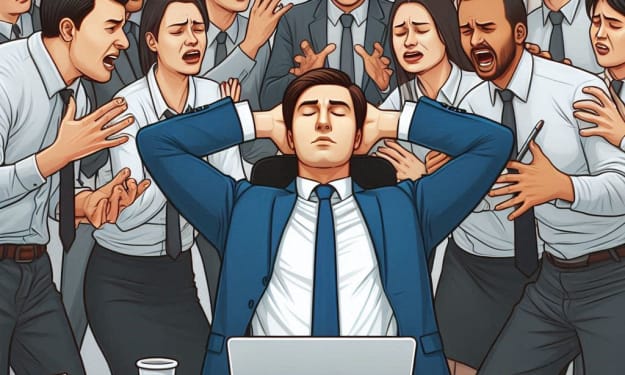Independence or Loneliness
Finding Peace in Solitude When Life Gives You No Choice

An aspiration for independence seems to be one that many of us share. Perhaps our progressive freedom through the decades has resulted in an ambition for self-reliance - especially among women who strive to be their own providers. Though this dependence on oneself can positively contribute to the views one has on the relationships present in their life, we are social creatures by birth. Developing intimate relationships and regular human contact fuels us to live fulfilled lives. So, what happens when you lose one of these relationships? The person who made you feel most content. Who you could do nothing with and feel okay - like life made sense. Like it did not really need to make sense. Solitude fills the space of the one who has left. And, solitude never leaves. You are left with no choice other than to resent its presence, draining all hope and happiness from your future. Or, perhaps, to befriend it.
When I see somebody alone amongst a public crowd, I tend to admire them. Such as the woman sitting beside me reading The New Yorker. Twisting her hair into a bun and sipping a mug of tea in between page turns. From my perspective, she is comfortable. Comfortable in her casual clothes and comfortable within herself. Unlike I, red dress and red lips, attempting to make conversation with my solitude. Desperately ensuring that they are having a good time. Although, the stranger on my left could be doing the same thing. Feeling the same way, as I do.
Most common experiences portray that others do not perceive my lack of physical company to be a symbol of satisfaction with that of my own. No, they assume quite the opposite. Something must be wrong with me. It is devastatingly obvious. During the interval of a theatre production one Monday evening, a slightly inebriated man approached me and asked if I was there alone. 'A bit weird to come to a show on your own.' He told me loudly, capturing the attention of those surrounding. Holding back tears, I took my seat as he stumbled off to the bar, leaving his wife behind. Do you think I chose this? I wanted to say. Other comments I receive are, 'Do you always do things alone?' and 'Where's your boyfriend?' If you find him, let me know.
Yes, seclusion is not always enjoyable. At times, I find myself silently crying amongst a crowd outside The Tower of London or in the concealing shadows of a movie screening. My reason for being alone hinders my gratitude for what I am experiencing. However, there are subconscious practices that I implement during my times of isolation that attempt to fill the emptiness. Visiting somewhere new alone tends to make the loneliness louder and harder to ignore. Usually, I seek the few coffee shops that I regular. I know where to sit, when it is busiest and who I will see. The ease I feel greeting and interacting with familiar baristas, in particular, is what Joe Keohane labels as "weak ties" in his book The Power of Strangers. Through an experiment entailing varying amounts of acquaintance interaction, Keohane states, "people were happier on days they had more weak-tie interactions than days when they had fewer."
An, admittedly, rather toxic exercise that I practice to appreciate my solitude at home is to put myself into an isolating public environment. Feeling uncomfortable and suffocated on a packed tube train or the flooded streets of Central London, I find I can breathe a little easier in the confines of my own house after. My poetry collection, a love letter to london, personifies the city as an abusive lover. This unhealthy act of visiting somewhere chaotic only to enhance my gratitude for the silence of my home is represented in the following poem. "honestly,/ I feel at times that I use you/ when I am sad/ because you make me feel/ even lonelier than I was/ and it makes me appreciate/ where I was moments before/ I saw you."
Being a poet does encourage me to turn my negative emotions and experiences into something positive - into art. Often, I wonder if I would still be a writer if I were happy. What would I write about? Would I not just, live? In his established piece, Letters to a Young Poet, Rainer Maria Rilke conveys solitude in a romanticised light. Instructing the receiver of these letters, Mr Kappus, to love his solitude, Rilke consoles, "take pleasure in your growth, in which no one can accompany you". Owning three copies of the very book, as well as a gold ring I had engraved with the word "solitude", I believe I may have part of this wisdom engraved within me. When I visit the sea, I prefer to do so alone. I want to be the only guest in which foreign countries must entertain during my stay. As much as I adore conversation over cups of coffee with people who make up the foundations of my soul, I have grown familiar with my solitude. We sit silently reading together over black coffee steam. Though, at times I wonder what sensations I may be vacant to without a partner, I am more interested in the opportunities I could share with my solitude - and, indeed, my loneliness. For if it is all that consumes me, must I not make good of it?
About the Creator
Enjoyed the story? Support the Creator.
Subscribe for free to receive all their stories in your feed. You could also pledge your support or give them a one-off tip, letting them know you appreciate their work.






Comments
There are no comments for this story
Be the first to respond and start the conversation.